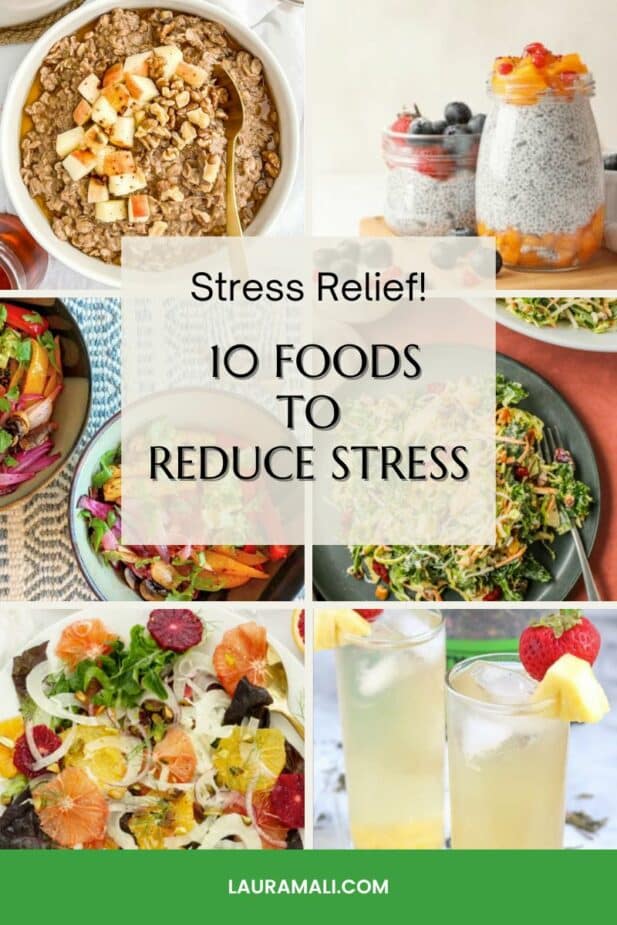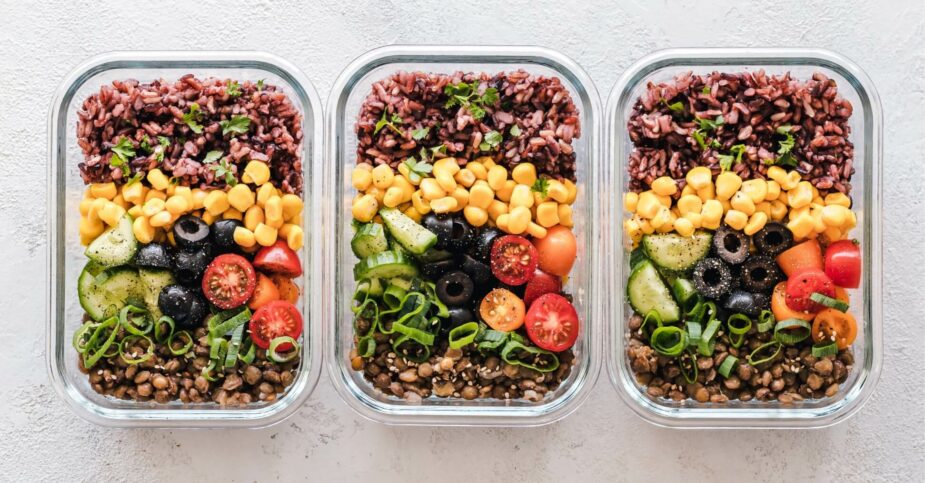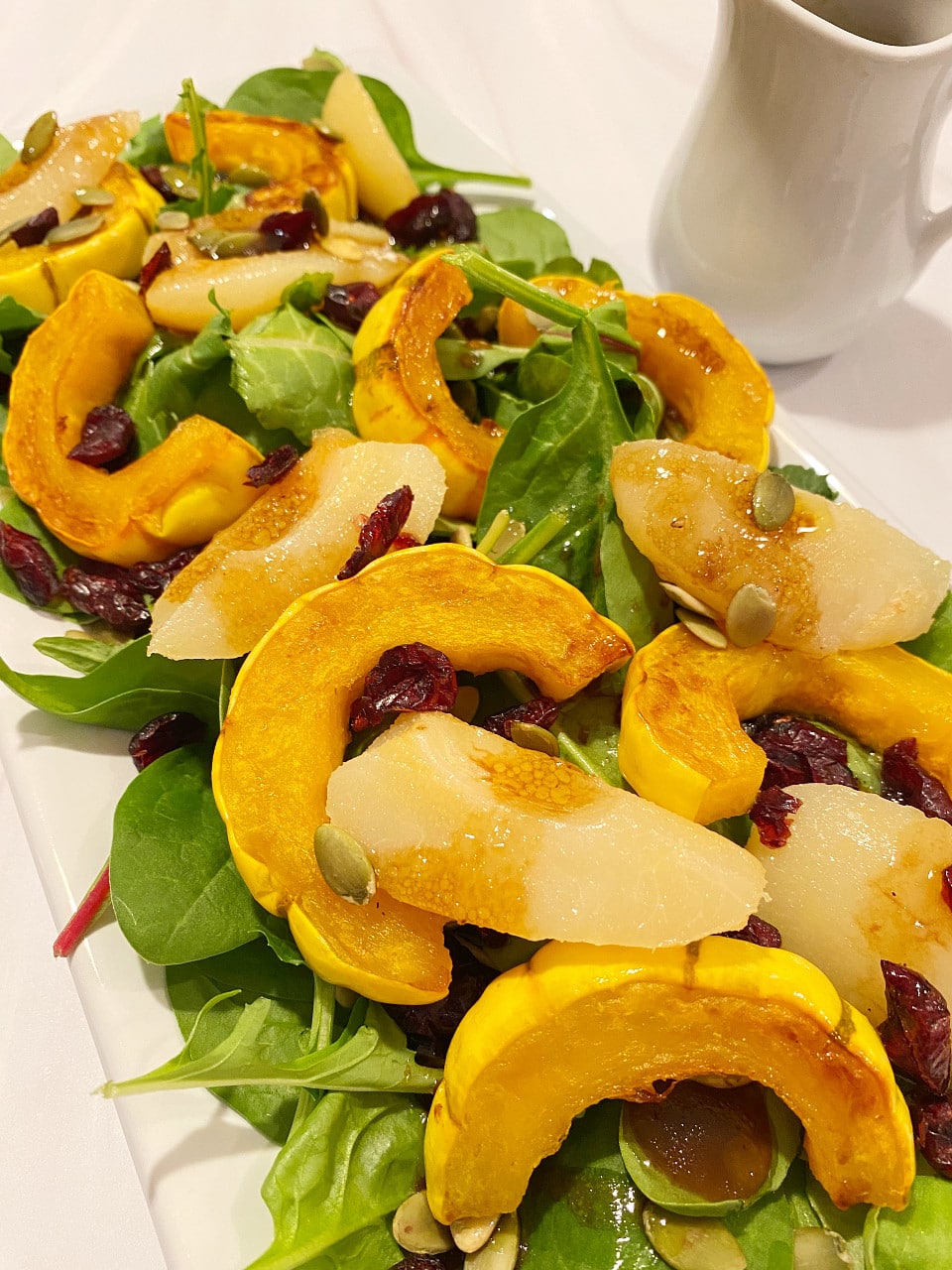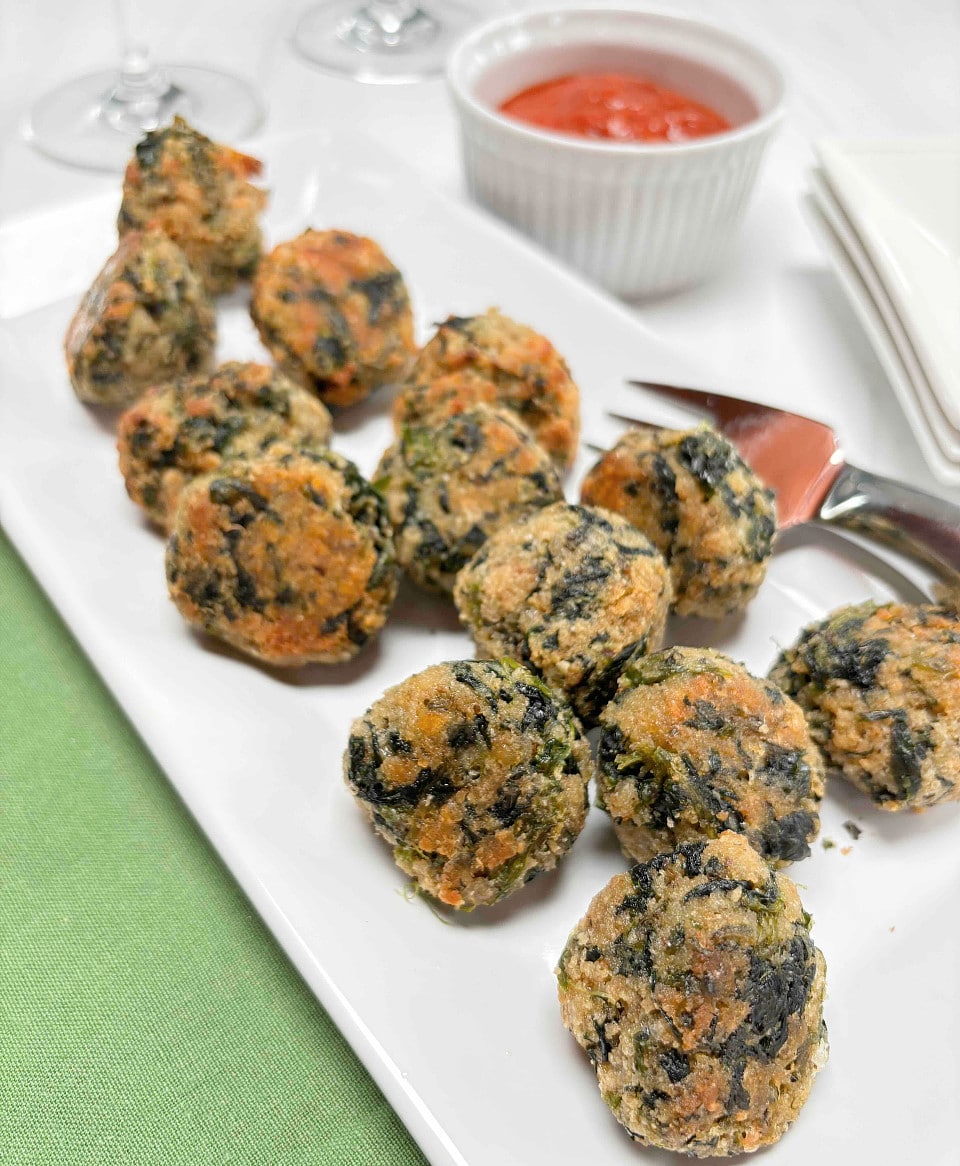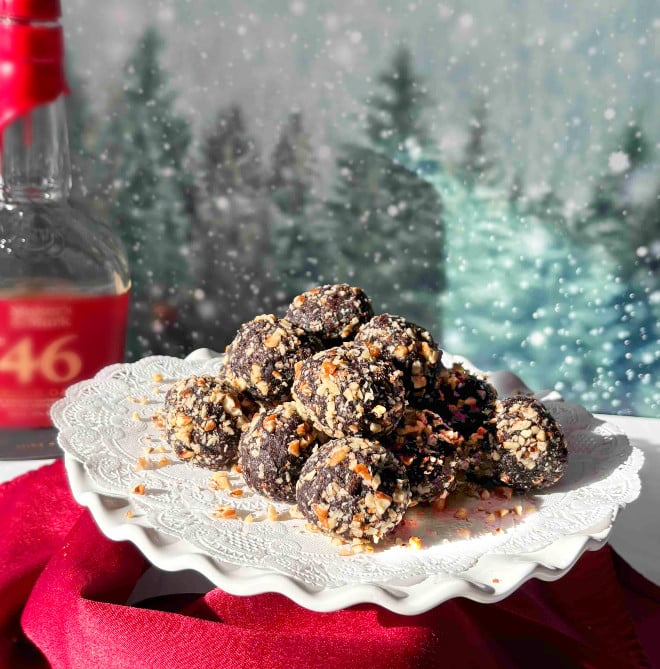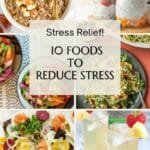Updated: 5/2/2024 Original: 12/22/2021
ARTICLE SUMMARY
1. The food we eat can be a secret weapon in managing stress. Certain foods can play a role in minimizing your stress and anxiety levels through a connection between the gut and brain.
2. Some foods are considered stress-reducing foods and some may exacerbate stress. Dive into the science behind how beans, citrus fruits, dark chocolate, nuts, and more play a role in helping to combat stress.
3. Avoiding Stress Aggravators: Just as important as eating foods that help manage stress, understanding which foods have more of a detrimental effect is important too. Certain choices exacerbate stress and limiting these foods can positively impact not just your stress level but your overall well-being too.
It doesn’t matter what time of the year it is, stress just seems to be a constant part of our lives. And while there are many well-known strategies to help with it, foods that reduce stress are commonly forgotten about.
You may not realize it, but by making a few changes to some of the foods you eat, you may just be able to take your stress down a peg or two.
Just as the food we eat affects our heart, weight, and GI tract, it can also play a big role in our feelings, mood, and how we react to difficult situations. As a registered dietitian there are foods I try to include regularly to help manage stress and things I recommend to my clients too.
In this article, we’ll look at 10 top foods that can help manage stress (and how they work).
Table of Contents
Foods That Reduce Stress – How Does it Work?
To kick things off, why – and how – does food help our stress levels? Quite simply, it is because some of the nutrients in the food can trigger our stress hormones. Cortisol (increases stress) and serotonin (decreases stress) are the two that regulate our stress levels and a variety of nutrients can increase or decrease them.
Now, there is a lot more to it and I explain just how foods can impact how we feel at the end of this post (click here) or you can read more about how food plays a BIG role in our mood in my other article about Food and Mood.
But honestly, if you clicked on this article, you probably just want to get to it and find out the top 10 foods to help with stress – so let’s dive in and see which foods we should prioritize to help reduce stress!
What Foods Are Stress Reducers?
The nutrients in our food work in several ways to help reduce stress. Here are my 10 favorite stress-relieving foods to help manage those hormones and provide a steady supply of energy to your brain.
Beans
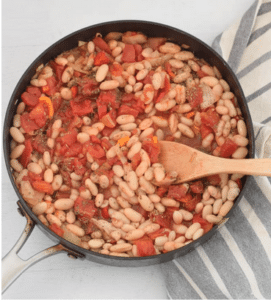
In addition to being a good source of protein and fiber, beans are rich in magnesium and the amino acid L-tryptophan which are both important for stabilizing our mood.
Eating beans doesn’t have to mean just chili! There are so many ways to add beans to your meals and snacks. Adding a can of beans to a vegetable soup like Minestrone or my Italian Sausage and Bean soup is a great way to start.
Beans also make an excellent addition to salads, added to pasta for a protein boost, or are a good base for hummus or a bean spread or dip.
Did I mention that beans are also super affordable? Cutting your grocery bill might just reduce your stress even further!
Favorite bean recipes:
- Lemon Chicken and White Bean Soup
- The Best Kidney Bean Chili Recipe
- Vegetarian Quinoa and Bean Stuffed Peppers
- Best Vegan Cannellini Bean Recipe – Pizza Beans!
Citrus
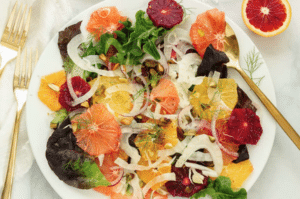
Oranges, grapefruit, lemons, and limes are packed with the antioxidant vitamin C, with one orange providing almost the recommended daily amount. Some research has shown that higher intakes of vitamin C help reduce feelings of anxiety during stressful situations.
Citrus doesn’t always need to be included just at breakfast either. Some of my favorite ways to include more citrus fruits are to add grapefruit or orange segments to a salad, or lemon to fish.
If you have never segmented an orange before, don’t worry, you’re not alone! Check out this post where I show you step-by-step how to do it.
Favorite citrus recipes:
Dark Chocolate
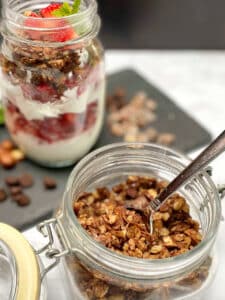
Okay, so maybe I said hitting the candy dish for a snack wasn’t such a great choice but, there is something to enjoying a piece of dark chocolate that can boost your mood, relax you, and give you a little pick me up.
Dark chocolate is rich in flavonoids, antioxidants found in plants that help improve blood flow to your brain.
The more the better, right :)? Not so fast! Just a small piece every day will do the trick! Enjoy a little piece after dinner for a treat or add a few dark chocolate chips to some nuts and dried fruit for an afternoon treat or even your morning granola!
Favorite dark chocolate recipes:
Nuts
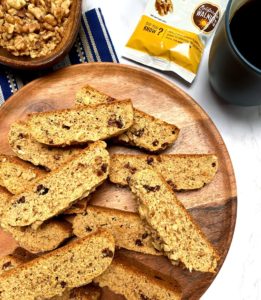
Rich in protein, fiber, vitamin E, magnesium, and polyunsaturated fats, these nutrients may help lower inflammation, protect against stress, and may have a role in reducing anxiety and depression.
I love the way nuts add a delicious “crunch” to salads and often add them to quick bread and muffins to give them a bit more “oomph” and texture.
Favorite recipes with nuts:
Sesame Seeds
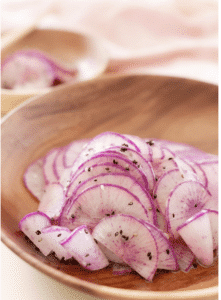
Along with nuts, seeds are also a good choice. Sesame seeds contain tryptophan – the amino acid found in turkey that so many people associate with sleepiness!
Tryptophan works with our brains’ communication systems to help us relax and boost our mood.
Tahini is a paste made from sesame seeds and often used to make hummus which is a great snack that incorporates both brain-healthy beans and sesame seeds and fills you up by providing protein and fiber so it is a win-win and easy snack.
Favorite recipes with sesame seeds:
- Velvety Smooth Tahini Salad Dressing – From Kiran Campbell Nutrition
- Sesame Crusted Ahi Tuna Power Bowls – From Jenny Shea Rawn
- Purple Daikon Radish with Black Sesame Seeds – From The Sound of Cooking
Fermented Foods
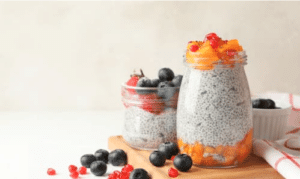
Probiotics work in our gut and feed the healthy bacteria found there. But there is also a brain-gut connection. Probiotics from fermented foods, like kefir, miso, tempeh, sauerkraut, and kimchi support the bacteria in your GI tract. A more robust microbiome can lead to an improved mood, a greater sense of calm, and less anxiety.
Mixing up a smoothie with kefir and berries is a delicious way to start the morning and I love using miso in a dressing or marinade for a little umami flavor boost.
Favorite recipes using fermented foods:
Leafy Greens
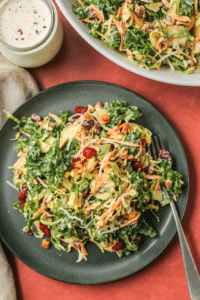
Packed with antioxidants that help reduce inflammation, leafy greens are also a good source of magnesium (remember how beans were also a source of this important mineral?). People who have lower intakes of magnesium tend to have higher rates of anxiety.
And something you may not know is that people with consistently high stress levels tend to have lower levels of magnesium. Stress can impact the amount of magnesium your body hangs on to and not having enough magnesium could also increase your stress reaction.
Adding some spinach, kale, and Swiss chard to your meals can replace some of the magnesium lost due to stress and get you back to feeling calmer.
A spinach salad, adding some greens to soup, or tossing them into a grain bowl are easy ways to boost your intake of leafy greens.
Favorite recipes with leafy greens:
- Italian-Style Beans and Greens
- Kale and Brussel Sprout Salad
- Stir-Fry Spinach with Garlic
- Calvo Nero Salad (Tuscan Kale Salad)
Seafood

You probably know that eating seafood is good for your heart, but it’s also vital for your brain health too. Fats make up over 60% of the weight of your brain and healthy fats, specifically omega-3s, are the majority of them. Okay, so what does that mean?
Healthy fats contribute to the growth and development of your brain cells. This is especially important for babies as they and their brains are growing, but these fats are also essential for us at all ages.
These fats have a role in regulating mood and anxiety levels and possibly reducing stress. While we aren’t sure exactly how they help, researchers have found a link between low levels of omega-3s and higher rates of depression.
Now, I don’t mean fish and chips – although, once in a while, there is nothing better! The “fatty” fish I mean includes tuna, salmon, halibut, and sardines. In addition to the high levels of healthy omega-3s, these fish are also good sources of vitamin B12 and selenium, two important nutrients that may help reduce the risk of depression.
If you are hesitant to cook seafood at home check out some of my favorite, easy, and healthy ways to prepare seafood at home.
You can also check your prepared foods section of the grocery store for already-cooked salmon filets or crab cakes for an easy dinner. One of my all-time favorite and simplest ways to add a little more seafood is to add some canned tuna, salmon, or sardines to a salad or stir it into pasta for dinner.
Favorite seafood recipes:
Tea
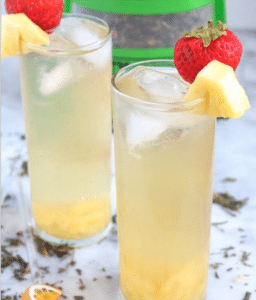
Green tea, black tea, herbal teas, and newer to the market, Matcha tea, all have properties that can help relax the mind and reduce stress. While you may think only herbal teas can have this effect, all types of tea may be able to help reduce our stress levels. Here’s how we think it works.
Both green and black tea contain polyphenols or compounds found in plants that have antioxidant properties. Those nutrients help reduce inflammation in our brain and keep that communication system between our gut and brain working.
While caffeine provides the stimulant effect of tea, it also contains an amino acid called L-theanine which has a calming effect that helps cancel out some of the stimulation people experience from caffeine.
Chamomile and peppermint have been used for centuries as calming agents and to help with sleep.
Matcha, a powdered form of green tea, contains L-theanine, an amino acid that modulates brain pathways and some research has shown that it can help reduce stress.
For me, every afternoon I treat myself to a cup of tea and curl up with a book or magazine for a half hour. It’s just the break I need and helps me reset so I can hit my afternoon running with a clear mind.
Tea recipes to try:
- My friend and colleague, Holly Larson loves this chamomile tea and vanilla almond milk soother every night.
- Place 4 chamomile tea bags in a quart mason jar, filled halfway with boiling water. Let them brew for a few minutes and remove them.
- Add cold water to fill the mason jar and store it in the fridge.
- When you are ready, fill a mug ⅔ of the way with the chamomile tea and ⅓ with vanilla almond milk. Delish!
- Fruity Green Tea Spritzer
Whole Grains
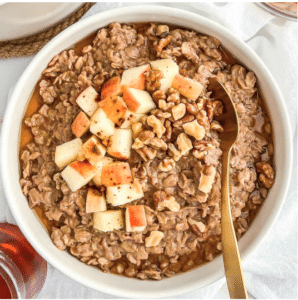
Whole grains including brown rice, whole-grain pasta, quinoa, barley, and oats are good sources of fiber that help keep our gut healthy. Earlier I mentioned that stress relief all starts in the gut and I meant it!
These fiber-rich grains provide food for the healthy bacteria in your gut. Keeping them happy and fed, helps keep you calm and can improve your mood.
And who doesn’t think a bowl of pasta isn’t just the ultimate comfort food? It always puts me in a better mood! Give whole wheat pasta a try. Add a leafy green salad on the side to boost those healthy bacteria and watch your stress level take a nosedive.
Favorite whole grain recipes:
Foods to Limit for Lower Stress Levels
In general, foods that are high in certain types of fat and sugar may contribute to or exacerbate high levels of stress – or at least make it more difficult to stay calm.
This has been shown in research too, especially among university students who may already be under a fair amount of stress. The higher their fat intake, the more they reported high levels of stress.
Could it be a vicious cycle? The more stress you feel, the more tempted you are to reach for something high in sugar and fat. Comfort food, right? Well, maybe.
While the science behind the relationship between food and emotions is still developing, here are a few things we do know:
- Fried Foods: I’ll admit it – I can’t pass up a good batch of french fries! However, I also know that too many fried foods, too often, can reduce the healthy bacteria in your gut. Why does that matter? It goes back to that gut/brain communication system. When you are stressed, your cortisol level increases and you don’t have anything telling it you’ve had enough and it’s time for serotonin to come out of its hiding place.
Think about fried foods as a treat and enjoy them once in a while but focus on eating more of the stress-relieving foods every day.
- Saturated fat: While saturated fat is known to lead to clogged arteries and heart disease, it is also attributed to the build-up of plaque in the brain.
While we have learned that an excess of plaque can contribute to dementia and Alzheimer’s disease, it can also wreak havoc on our emotions and reactions.
Foods that are high in saturated fat include:
- High-fat meats like bacon, sausage, and highly marbled or fatty cuts of beef, pork, and lamb.
- Lard, butter, coconut, and palm kernel oil.
- Full-fat dairy products including cheese, cream, ice cream, and whole milk.
Added Sugar: Sugar does impact our blood sugar levels which can have a significant role in how we feel and react to events. When your blood sugar drops you may feel tired and cranky. If that lasts a while, well, it tells your liver that you need more sugar, releasing it into your bloodstream while at the same time telling your brain that something is wrong and cortisol is then released which allows that sugar to be used for energy.
When this happens once in a while, it isn’t an issue, but if this is more of a regular occurrence, it could lead to insulin resistance and the development of diabetes.
Many foods contain natural sugars. Milk, fruit, and starches naturally contain some sugar, and those sugars are okay because they also contain other high-quality nutrients that are beneficial.
Just like fried foods and saturated fat, you don’t need to avoid “added sugar” completely – just limit how much you eat. It’s a good idea to limit your intake to under 50 grams a day.
You can now find out how much “added sugar” is in a food product by looking at the Nutrition Facts label.
Other Tips to Help Reduce Stress
Along with eating a healthy diet there are a few other habits you can adopt that can help you manage or reduce your stress levels. Here are a few of my favorite habits:
- Take a walk – This is a great way to reset. Get outside and take even a 10-minute walk. Just some fresh air and a change of scenery may be all it takes to get a fresh view of things.
- Spend time with others – Whether it’s curling up on the sofa with your significant other and a good movie, dinner with friends, or grabbing a cup of coffee with a colleague, spending time with others will help you refocus on what is really important in your life.
- Volunteer – Donate a few hours a week with your church, delivering meals to the elderly or helping your favorite charity with a project. Helping others who are less fortunate than you is another great way to put your issues into perspective.
- Play in the garden – There is something about getting close to nature that has a calming effect on me. Just 10 minutes outside pulling weeds, planting flowers, or even spreading mulch helps me forget what was bothering me so much!
- Put on your favorite music – Can you hear the beat of your favorite song? A little music in the background and before you know it you’ll be tapping your feet, drumming your fingers, maybe even typing in the rhythm of the beat. Music has a wonderful calming power!
- Play with your pet – What is better than unconditional love? The wag of your dog’s tail, the gentle rub on your leg from your kitten, or the gentle song from a songbird – animals just have a way of putting a smile on my face. Don’t have a pet? Offer to take your neighbor’s dog for a walk. Or head to the local shelter to see if you can volunteer to walk the dogs.
- Breathe – When I feel stressed and don’t have time for any of the above, just closing my eyes for a minute or two and taking a few deep breaths often settles me down and has an amazing calming effect.
- Journal – Take a few minutes every morning to ground yourself for the day. Maybe it’s writing down things you are grateful for (always a good way to start the day). Or just writing all your thoughts down and things you want to accomplish during the day or week. Just the act of writing and organizing your thoughts is a good way to set the stage for a productive day. Being realistic about what you can accomplish also helps you manage when something unexpected happens.
- Want a cute journal to jot all those daily inspirations down in? Check out my little Blueberry Notebook on Amazon (affiliate link)!
How These Foods Reduce Stress
So now you know what to eat to help reduce stress and hopefully have some delicious new recipes to try too!
If you want to get into the nitty-gritty of the “Why and How” keep on reading!
In addition to what we eat, stress management through nutrition really all starts with a healthy GI tract. We are starting to realize that much of our health and mood boils down to our gut health.
The gut-brain connection
Our gastrointestinal (GI) tract is lined with a variety of bacteria and microorganisms that help us break down and absorb nutrients. You may have heard this by another name, the gut microbiota or even the microbiome – the same thing. While it may sound scary to know you have a variety of bacteria in your GI tract, these guys are healthy bacteria. The more we have the better.
Our microbiome helps keep our GI tract strong. They support our immune system and fight off harmful bacteria and viruses. And what is fascinating is that we are learning that they also communicate with our brains.
How does this communication work?
It’s still not entirely understood but we now know there is a network between our GI tract and our brain called the “Gut-Brain Axis.”
Hormonal messengers
This “Gut-Brain Axis” is a way for our healthy bacteria and the brain to communicate – and they do that in a variety of ways.
Think about all the different ways you might talk with your friends and family. Maybe it’s an email, a phone call, or a text message, or funny meme on Facebook or Instagram. When it comes to our gut and brain, the “messages” can vary and are directed to hormones or other messengers that impact how we feel.
Specific foods can dial up “stressful messages” and trigger hormones that increase stress. Or, they can dial it down by sending signals to hormones that have more of a calming impact. Two of the most active hormones when it comes to stress and stress relief are cortisol and serotonin.
- Cortisol is also known as our “stress” hormone. It is important in what we know as our “fight or flight” response. Cortisol triggers the release of glucose when we need extra energy to manage stressful situations.
Some foods reduce cortisol or slow its release. Some of the best foods to reduce cortisol are fermented foods. These include kefir, sauerkraut, tempeh, and miso. Foods that are rich in polyphenols like pomegranates, grape juice, and green tea can also help reduce cortisol.
- Serotonin is another hormone that produces feelings of calm and contentment. Foods that are rich in probiotics, like yogurt and kefir, are good examples of serotonin-releasing foods. Fiber-rich foods, like beans, legumes, and whole grains also increase your serotonin levels.
What about fast food, high-fat, sugary, or carb-heavy foods? Sure, they taste good at the time and don’t get me wrong, sometimes they really hit the spot.
Unfortunately eating too many of these foods, too often can deplete those healthy bacteria. This slows the gut-brain communication system. You may feel a bit down, tired, worn out, or more stressed after eating them.
Important note:
The takeaway isn’t that you should never eat these fun foods! Just to keep them in balance with the foods that nourish your body and mood.
But wait, there’s more:
There are other ways what or how we eat can affect our stress levels.
How about when you are so busy that you skip a meal or grab a few cookies, or sweet treats quickly thinking they will hold you over? You may notice that you’re low on energy, tense, and a bit short-tempered after a while.
Not eating or eating something high in sugar can impact our blood sugar levels. Foods that are high in sugar or are very carb-heavy can raise our blood sugar quickly and then have it come crashing down. Skipping a meal altogether diminishes the supply of sugar, or energy to our brains.
Your brain is like a car – it needs constant fueling – with the right foods – or it will just sputter and struggle along.
Bottomline
A little stress in our lives is normal, but when it becomes more regular and chronic it can contribute to a variety of health issues including heart disease, diabetes, and obesity. Learning how to manage our stress when it does occur and eating a healthy diet will help minimize it.
Looking for more tips and ideas for how to support your brain health and live a more vibrant life? Join my community and I’ll share a 7-day MIND Diet Meal plan complete with recipes and a shopping list to kick-start your way to a happy, healthy, and energetic life.

